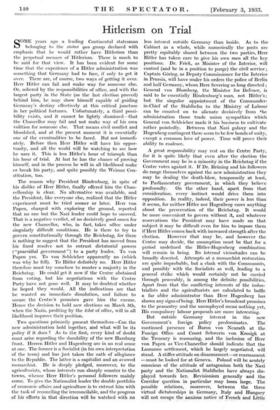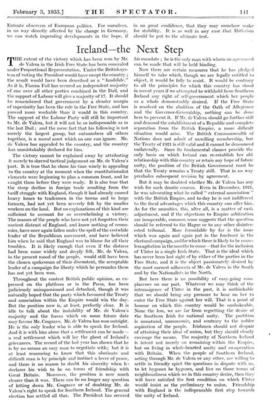Hitlerism on Trial
SOME years ago a leading Continental statesman belonging to the status quo group declared with emphasis that he would rather have Hitlerism than the perpetual menace of Hitlerism. There is much to be said for that view. It has been evident for some time that the experience of a Hitler administration was something that Germany had to face, if only to get it over. There are, of course, two ways of getting it over. Herr Hitler can fail and make way for someone else. Or, sobered by the responsibilities of office, and with the largest party in the State (as the last election proved) behind him, he may show himself capable of guiding Germany's destiny effectively at this critical juncture in her political fortunes. Unfortunately, a third possi- bility exists, and it cannot be lightly dismissed—that the Chancellor may fail and not make way of his own volition for someone else. That means civil conflict and bloodshed, and at the present moment it is essentially one of the eventualities to be faced. But not immedi- ately. Before then Herr Hitler will have his oppor- tunity, and all the world will be watching to sec how lie uses it. This is less Hitler's hour of triumph than his hour of trial. At last he has the chance of proving himself, and in the process he will in all likelihood make or break his party, and quite possibly the Weimar Con- stitution, too.
The reason why President Hindenburg, in spite of his dislike of Herr Hitler, finally offered him the Chan- cellorship is clear. No alternative was available, and the President, like everyone else, realized that the Hitler experiment must be tried sooner or later. Herr von Papen, charged with exploring the ground, reported that no one but the Nazi leader could hope to succeed. That is a negative verdict, of no decisively good omen for the new Chancellor, who, in fact, takes office under singularly difficult conditions. He is there to try to govern constitutionally through the Reichstag, for there is nothing to suggest that the President has moved from his fixed resolve not to entrust dictatorial powers (" praesidial government") to a party leader. To von Papen yes. To von Schleicher apparently no (which was why he fell). To Hitler definitely no. Herr Hitler therefore must try somehow to muster a majority in the Reichstag. He could get it now if the Centre abstained from voting, but his negotiations with the Centre Party have not gone well. It may be doubted whether he hoped they would. All the indications are that he wanted an immediate dissolution, and failure to secure the Centre's promises gave him the excuse. Hence the decision to hold new elections on March 5th, when the Nazis, profiting by the éclat of office, will in all likelihood improve their position.
Two questions primarily present themselves—Can the new administration hold together, and what will be its policy if it does ? As to the first, every kind of doubt must arise regarding the durability of the new Harzburg front. Herren Hitler and Hugenberg are in no real sense at one. The former is a Socialist (in his own interpretation of the term) and has just taken the oath of allegiance to the Republic. The latter is a capitalist and an avowed monarchist. He is deeply pledged, moreover, to the agriculturists, whose interests run sharply counter to the towns, whence Herr Hitler's personal followers mainly come. To give the Nationalist leader the double portfolio of economic affairs and agriculture is to entrust him with the task of reconciling the irreconcilable, and the progress of his efforts in that direction will be watched with no less interest outside Germany than inside. As to the Cabinet as a whole, while numerically the posts are pretty equitably shared between the two parties, Herr Hitler has taken care to give his own men all the key positions. Dr. Frick, as Minister of the Interior, will control (and be in a position to purge) the civil service ; Captain Goring, as Deputy Commissioner for the Interior in Prussia, will have under his orders the police of Berlin and half Germany, whom Herr Severing so long directed ; General von Blomberg, the Minister for Defence, is said to be essentially" Hindenburg's man, not Hitler's ; but the singular appointment of the Commander- in-Chief of the Stahlhehn to the Ministry of Labour can be counted on to alienate decisively from +he administration those trade union sympathies which General von Schleicher made it his business to cultivate rather pointedly. Between that Nazi galaxy and the Hugenberg contingent there seem to be few bonds of unity, except a common love of power. Time will prove their ability to coalesce.
A great responsibility may rest on the Centre Party, for it is quite likely that even after the election the Government may be in a minority in the Reichstag if the Centre votes against it. If Dr. Bruning and his followers do range themselves against the new administration they may be dealing the death-blow, temporarily at least, to Parliamentary government, in which they believe profoundly. On the other hand, apart from that consideration, every - instinct would drive them into opposition. In reality, indeed, their power is less than it seems, for neither Hitler nor Hugenberg cares anything about the preservation of the Reichstag. It would be more convenient to govern without it, and whatever reservations the President may have made on that subject it may be difficult even for him to impose them if Herr Hitler comes back with increased strength after the election. However that may be, and howeVer the. Centre may decide, the assumption must be that for a period undefined the Hitler-Hugenberg combination will remain in being. Its internal vicissitudes can be broadly descried. Attempts at a monarchist restoration are quite improbable, but a clash with the Communists, and possibly with the Socialists as well, leading to a general strike which would certainly not be carried through peaceably, is among the definite possibilities. Apart from that the conflicting interests of the indus- trialists and the agriculturists are calculated to baffle a far abler administrator than Herr Hugenberg has shown any signs of being. Herr Hitler's broadcast promises to the peasantry and the unemployed mean nothing yet. His compulsory labour proposals arc more interesting.
But outside Germany interest in the new Government's foreign policy predominates. The continued presence of Baron von Neurath at the Foreign Office and Count Schwerin von Krosigk at the Treasury is reassuring, and the inclusion of Herr von Papen as Vice-Chancellor should indicate that the Lausanne settlement, which he largely negotiated, will stand. A stiffer attitude on disarmament—or rearmament —must be looked for at Geneva. Poland will be acutely conscious of the attitude of antagonism both the Nazi party and the Nationalist Stahlhelm have always dis- played towards her. Revisionism generally and the Corridor question in particular may loom large. The possible relations, moreover, between the three virtual dictatorships in Germany, Italy and Hungary will not escape the anxious notice of French and Little
Entente observers of European politics. For ourselves, in no way directly affected by the change in Germany, we can watch impending developments in the hope, if in no great confidence, that they may somehow make for stability. It is as well in any case that Hitlerism should be put to the ultimate test.





































 Previous page
Previous page